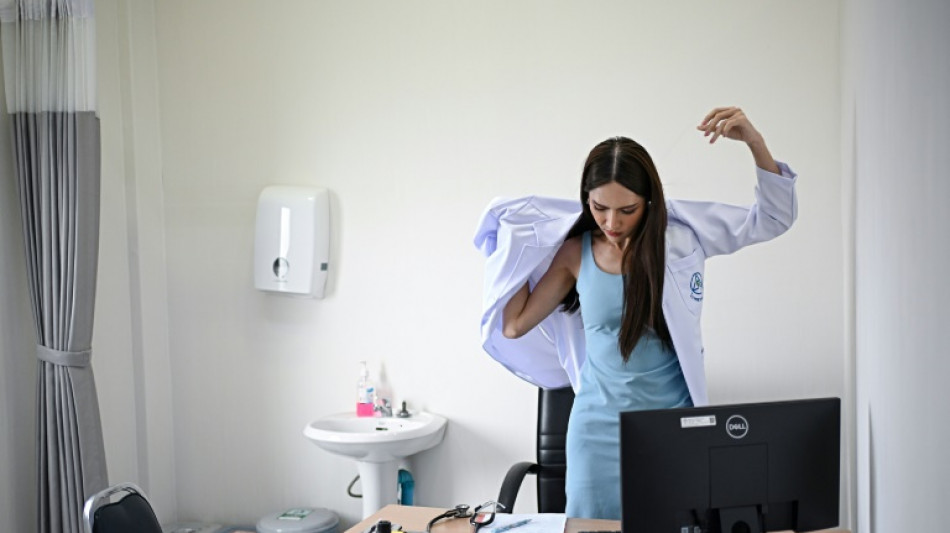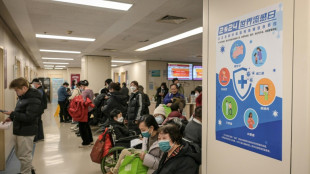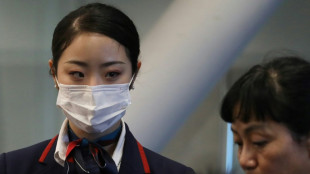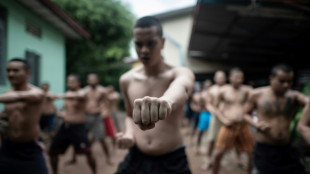

Thai trans people push to be 'truly' accepted
Stethoscope over her white coat, Thai doctor Kachisarah Sridakhot walks hospital corridors hoping to beat a path for other trans women to be fully accepted in the kingdom.
LGBTQ activists won a major victory last month when Thai lawmakers passed a bill that should see same-sex marriages become legal later this year -- a first in Southeast Asia.
Now campaigners are hoping to push the government to allow trans men and women to have their gender recognised in official paperwork.
Kachisarah knows the problem all too well -- despite identifying as a woman, she is still identified by the government as a man.
"This is discrimination," she told AFP.
The 26-year-old said she has fought for years to be able to express her true gender.
"At medical school, they didn't allow me to dress how I wanted to based on my gender, so I had to wear the male outfit," she said.
"The reason they gave me was that 'patients couldn't accept it', but in fact, (patients) just wanted to get better and they respected us for who we are."
It is not currently possible for a person to change their gender on documents such as ID cards and passports.
This can make even routine tasks like visiting the bank or passing through airport immigration a challenging or humiliating experience for transgender people.
- 'Feel like they really exist' -
Thailand has long enjoyed a reputation for tolerance of the LGBTQ community, hosting yearly pride events attended by locals and visitors from around the world.
But advocates have worked for decades to ensure LGBTQ rights become enshrined in law, struggling against traditional attitudes in a largely conservative Buddhist society.
A 2021 Human Rights Watch report found Thailand provides limited legal protection to trans people, who face harassment, discrimination and stigma.
A growing number of countries around the world allow people to change their legal gender on official documents and Thai activists are keen to enact similar changes in the kingdom.
A first attempt to pass a gender recognition bill, submitted by the progressive Move Forward Party (MFP), was voted down by parliament in February.
Activists say they are eager to push another draft -- this time from scholars and campaigners themselves.
The proposed bill would allow individuals the right to declare their gender, rather than be made to be identified by the gender assigned at birth.
Crucially, such a law would also allow trans people easier and safer access to vital medical care.
"People can say if they are male, female or non-binary," Nachale Boonyapisomparn, a trans activist who worked on the draft bill, told AFP.
More than 10,000 people -- the minimum legal requirement -- have signed a petition in support, and the bill is set to be submitted to parliament later this year for consideration.
MFP lawmaker and LGBTQ activist Tunyawaj Kamolwongwat said it would be a monumental step for Thailand.
"It will make LGBTQ people feel like they really exist in the society," he told AFP.
- 'No Sex Stigma' -
It is an issue that is especially close to Kachisarah's heart.
Hailing from Ubon Ratchathani province, the heartland of Thailand's rural rice-growing northeast, Kachisarah says she was a shy child whose parents were uncomfortable with her self-expression.
She attended medical school -- beginning her transition at 17 -- eventually becoming a doctor specialising in sexual health.
"I tried to prove myself to be accepted by the majority of society," she explained.
Now, she uses her platform –- a TikTok account called "No Sex Stigma" -– to try to counter a dearth of medical knowledge among the LGBTQ community in the kingdom.
Known as "Dr Bruze" to her 6,000 followers, she shares information about safe sex practices, as well as advice on hormone supplements.
"Some people I know had problems with their liver because they didn't take medication correctly," she said.
Ultimately, she hopes improving education about and for the LGBTQ community will change perceptions.
"If Thai society truly accepts us, we wouldn't have to struggle or prove ourselves."
S.Carlevaro--IM




